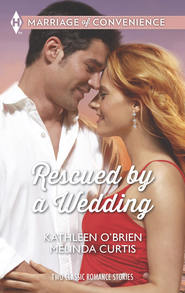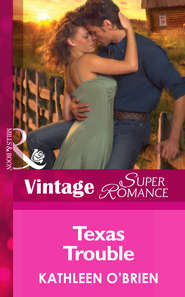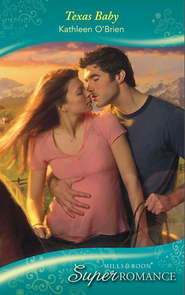По всем вопросам обращайтесь на: info@litportal.ru
(©) 2003-2025.
✖
Mistletoe Man
Автор
Год написания книги
2018
Настройки чтения
Размер шрифта
Высота строк
Поля
“You’ll leave when I say it’s safe, Miss Blaisdell.” He looked her up and down, as if assessing her capacity for resistance. “Look, let’s get a couple of things straight. Your boss insisted on this eleventh-hour document delivery, not I. I was content to wait until the new year to purchase Hamilton Homes. I will, in point of fact, survive perfectly well if I don’t buy Hamilton Homes at all.” He met her gaze directly. “Which is more than we can say for your boss, isn’t it?”
“That’s not the point,” she began, but he raised a finger to quiet her words.
“It’s the truth,” he said. “Now let’s be even more honest, shall we? You don’t like me. I remember our last encounter with crystal clarity, and I’m well aware that you’d prefer to be anywhere but here. However, here you are, and you must have known the risk you were taking. Winter in these mountains is notorious. If you’ve been caught by it, we’ll just both have to live with that.”
Her cheeks were burning, but she refused to be intimidated. “My sister needs me, Mr. McKinley,” she repeated stubbornly. “I don’t think you understand—”
“No, damn it, it’s you who doesn’t understand.” He put his hand on her back and with a rough motion turned her toward the picture window. “Look out there. We have a path that leads to Roc’s apartments. It’s newly paved, and it’s lined with tulips in the spring. Can you see it? Can you even begin to guess where it is?”
She looked, desperately scanning the blank white ripples of mounded snow for anything that resembled a path, but she could find nothing.
“No, of course you can’t.” She tried to turn away, but his palm was still hard against her back, forcing her to face the window. She didn’t dare to speak. He suddenly seemed so intense, almost angry, and she wasn’t sure why. Was it because they had finally mentioned the past, that day three years ago when she had uttered one unforgivable sentence?
“You have no idea how treacherous this pretty snow can be,” he said, his voice deeper now, almost hypnotic. “It distorts distances, erases landmarks. Take one wrong step, and you can sink into a pocket ten feet deep. Lose your way once, for even ten seconds, and it’s virtually impossible to reorient yourself.”
“But Roc would be driving,” she said quietly. “We’d be in a car.”
“Roc is seventy-four years old, Miss Blaisdell, and he has one hand. He’s hardly anyone’s superhero. You could drive in circles until you run out of gas and then walk in circles until you’re so exhausted you can’t think straight.”
“But—”
“Would that help your little sister?” He lifted her hand, lightly squeezing her fingertips between his thumb and forefinger. The nerves tingled, and a rapid pulse tnpped against the pressure. “In fifteen minutes your hands and feet would be numb.” He lifted her hand and cupped it against her cheek. “You wouldn’t be able to feel your own face.”
She shivered suddenly, thinking of that bitter cold, of fingers that would never again feel such warmth as this…
He dropped his hand. “And then you would die, Miss Blaisdell. It’s as simple and as terrible as that.”
She turned, but, looking at him, she suddenly didn’t know what to say. His full mouth was downturned and weary. His eyes looked haunted, seeming to stare right through her. And finally she knew what he had really been talking about. Not her death, but another’s. Another car that had foolishly tried to leave this mountain during a blinding, numbing snowstorm. A car that hadn’t, horribly, even been found for two whole days. A car that, when found, had held the frozen bodies of a beautiful woman and her little girl…
“I’m sorry,” Lindsay said, her throat thick and aching with emotions she had no right to express. No right, really, even to feel. “Of course you’re right. I’ll stay.”
Roc brought them lunch in the office area, and while they ate the surprisingly delicious fare—a light, creamy soup and a platter full of fresh fruits and hunks of cheese—Daniel finished studying the documents pertaining to Hamilton Homes.
Lindsay and Roc chatted quietly while Daniel read. Within a very few minutes, Lindsay found herself growing accustomed to Roc’s odd looks and earthy language. She even forgot about his hook, until, with a twinkling wink, he speared the last chunk of cheddar cheese with it and plopped it into his mouth. Lindsay blinked, and then, as if he’d done something quite clever, both of them laughed out loud.
Daniel looked up, frowning, his concentration broken, but Roc just laughed harder. “Go back to your homework, Danny Boy. Can’t you tell the lady and I are busy?”
And with no more than a wry twist of his mouth, Daniel did just that. Lindsay tried to relax. Roc was so natural, so uninhibited, treating Lindsay, whom he had known for approximately an hour, exactly the same way he treated Daniel—it really was impossible not to like him.
Daniel was another matter. Lindsay kept sneaking glances at him, wondering what he thought of the financial details he was learning about Hamilton Homes. It wasn’t all good news, not by any means. She tried to read the set of his mouth, the angle of his body, but it was hopeless. She didn’t know him well enough. She found herself distracted by the play of winter’s odd bluehued sunlight against the black of his hair.
“You wouldn’t know it now,” Roc said, breaking into her abstraction with a plaintive voice, “but twenty years ago I was a great deal more handsome than our Danny Boy. I was a big man, a man’s man, not puny like this fellow here.”
“I’m six-two, you old liar,” Daniel said without taking his eyes from the documents.
Roc chortled. “Puny, like I said.” He stretched out, black jeans covering limbs as long and thick as tree trunks. “Me, I’m not an inch under six-five, and if I’d met you twenty years ago I’d have swept you off your feet, Miss Lindsay.”
Daniel made one last note on the papers, and, sighing, he let the pen drop to the desk. “Don’t you have some caretaking to do, Roc? Big man’s man like you? Wood to chop? Roofs to shingle? Dishes to wash?”
“Nothing wrong with a man washing dishes,” Roc said defensively, lumbering to his feet. “Still, I’d better go,” he whispered to Lindsay as he gathered the empty bowls and munched the last of the grapes. “Danny here can’t stand the competition.”
When he was gone, Lindsay took a deep breath and, folding her hands in her lap, faced Daniel with the stoic air of a witness taking the stand. For Robert’s sake, she had to pull this off. Dear, gentle, improvident Robert, lying in a hospital room right now, impotently worrying, wondering how her interview was progressing.
She waited for the first question, the first scathing comment about what a financial mess Hamilton Homes was in. But the thick silence lengthened uncomfortably. Daniel merely sat with his elbows on his desk, looking contemplatively at her over his steepled fingers, until she felt such tension in her chest that she thought she might scream.
“I know the figures look bad,” she said, unable to bear the loaded silence another minute. “Robert’s been having some problems lately.”
“Evidently,” he murmured, his lips against his fingertips.
“Well, don’t you have any questions?” She had come armed with facts and proposals, with explanations for Robert’s errors and suggestions for how to redeem them. She’d certainly never pictured the interview going like this, with Daniel McKinley sitting there, bored or sleepy or just plain indifferent, his blue eyes half closed, his syllables short and ironic. “Don’t you want to know exactly how this happened, what went wrong?”
He smiled behind his fingers, but Lindsay wasn’t sure it was a pleasant smile. “I know what happened.” When she raised her brows skeptically, his smile broadened and he leaned back in his chair. “Actually, I knew before I even opened these documents—what I’ve read here has merely confirmed what I already suspected.”
“Oh, really?” His tone, so full of a natural, unassumed arrogance, annoyed her. She tightened her hands in her lap. “Why don’t you tell me, then?”
“All right.” He laced his fingers behind his head, a posture that made his shoulders seem even more impossibly broad. “I’d say it boils down to the three main problems. First, Robert Hamilton hired too many people, paid them too much, with luxurious benefits, and he could never bring himself to trim away any of the dead wood or lay off unnecessary positions, even during the recession. Your payroll is hopelessly bloated for a company in these financial straits.”
Her cheeks stung. She had been telling Robert things just like that for years. “Well, being too generous is hardly a sin, is it?”
He ignored her comment, putting one ankle over his knee to get more comfortable. She noticed that his legs were almost as long as Roc’s, though they were lean and muscular beneath the fine wool of his trousers, and didn’t resemble tree trunks by any stretch of the imagination.
“Second—he’s been building houses in all the wrong places, trying to provide single family homes in areas where the income ratios make apartment living far more logical. Then, in order to sell the places, he’s had to make extremely questionable loans. Now there’s a huge percentage of defaults which he’s refusing to call in. Instead of turning over these houses, trying to salvage his investment, he’s carrying these people for months at a time.”
She bit her lip. It was true. But it was part of Robert’s incredible goodness that he couldn’t bring himself to turn a desperate family out onto the streets. Though she had been warning him for months that he couldn’t be the Great Provider for long if he let his own company go under, now that Daniel McKinley was criticizing him in that dry, disinterested voice, she suddenly felt absurdly defensive.
“He realizes he’s been far too lenient, Mr. McKinley,” she said, ready with her prepared speech, though suddenly she felt little hope that she could make this ruthless businessman appreciate how Robert Hamilton’s idealism worked. “But, you see, he built his development in response to what he saw as a dire need for adequate housing among these plant workers. It was a tremendous success at first. Frankly, if there hadn’t been layoffs, the idea might well have worked.”
She took a deep breath. “I wish you could see the subdivision now, Mr. McKinley. These people aren’t deadbeats. They’ve planted trees and gardens. They’ve started their children in schools. Believe me, they will pay as soon as they can, and you know that this economic downturn won’t last forever. Robert was willing to dig into his own pockets, hoping against hope that he could find a way to let these people keep their homes until the economy improved.”
“Yes, Robert is a prince among men, I’m sure,” Daniel interjected dryly. “But now what? Now we come to the third and perhaps most troubling problem in this misguided troika—he’s taken out high-interest loans to cover his debts, and he’s secured those new loans with the few good properties he still owns. If he defaults, he’ll lose every profitable asset Hamilton Homes possesses, and the company will consist of a couple of hundred families who are busily planting marigolds in yards they can’t pay for.”
He leaned forward and tapped the thick pile of documents. “And then, Miss Blaisdell, Robert Hamilton won’t be able to sell this company for enough cash to buy a pair of gardeming gloves.”
Lindsay opened her lips to contradict him, but somehow no words would come. Again an uncomfortable silence blanketed the room. While she searched for the perfect answer, she touched her hair, tucking it behind her ear, wishing she had brushed it after that harrowing helicopter ride. She must look completely mussed and flustered. Which, of course, she was. Where had all her carefully crafted speeches disappeared to? Daniel hadn’t said anything that Lindsay herself hadn’t told Robert a thousand times. Why did hearing it from this man give the criticism so much authority, so much power to crush Robert’s good intentions to dust?
“There is one thing I do want to ask you, though,” Daniel said suddenly, and though his eyes were still narrowed, they no longer looked bored. They looked focused, probing.
“What is it?” She lifted her chin, ready.
“Why are you here?” He raised a hand to hold off her murmur of surprise. “I mean really why are you here? You must have known that the odds of persuading me to buy this business were about a million to one. And I suspect that you would rather jump naked into a river of hungry crocodiles than come begging for special favors from me.”
For a minute she stared at him, irritated by his confident assurance that she hated being here, that she was still afraid of him. He raised one brow and waited.
“Perhaps you’re right,” she finally said with all the equanimity she could muster. She had known he’d find a way to bring up the past, and she was ready for it. “But crocodiles, however hungry, rarely have enough liquid capital to pull off a deal like this.”
“I see.” He almost smiled. He leaned back again slowly. “Right. But you’re very young, attractive, capable. Why not go get yourself another job and leave Robert Hamilton to suffer the fate of all misguided martyrs?”
What a question! She stiffened, her short-lived poise evaporating. “Hamilton Homes is special to me, Mr. McKinley. Robert Hamilton is special to me. He’s been my employer for three years. He hired me when I was unexpectedly…out of work.”











